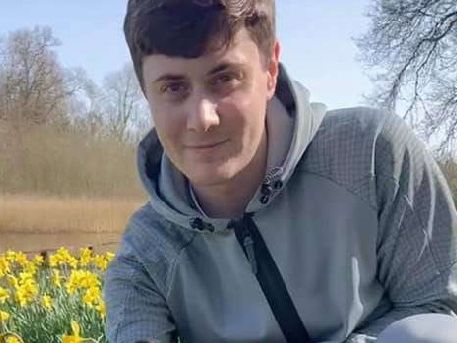Noeleen Eustace lost her 26-year-old son Kelvin Brennan when he took his own life
Noeleen Eustace lost her 26-year-old only son, Kelvin Brennan, when he took his own life in May.
Noeleen told how Kelvin, who had been diagnosed with Asperger’s Syndrome, generalised anxiety, dsypraxia and sensory processing disorder, had been let down by a system that does not recognise dual diagnosis.
She explained that dual diagnosis refers to people who experience both a mental health disorder and a substance use disorder at the same time.
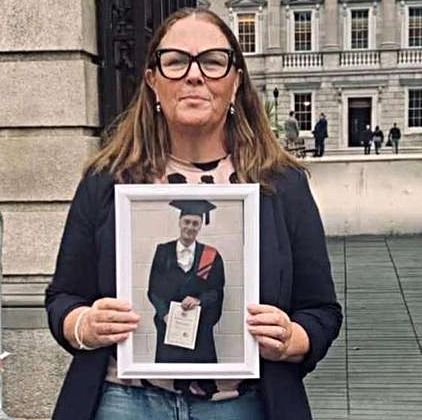
Noeleen with a photo of her son
However, it is not currently recognised in Ireland’s Mental Health Act, meaning it is difficult for patients to access treatment, particularly in emergency departments.
Noeleen, who lives in Newbridge, Co Kildare, explained that if Kelvin had presented at hospital with other health problems, such as a “broken leg or diabetes” he would have got a bed.
Noeleen revealed how her family desperately tried to help Kelvin, who had attended an emergency department up to 60 times in a single year, and had been expressing suicidal thoughts from a very young age.
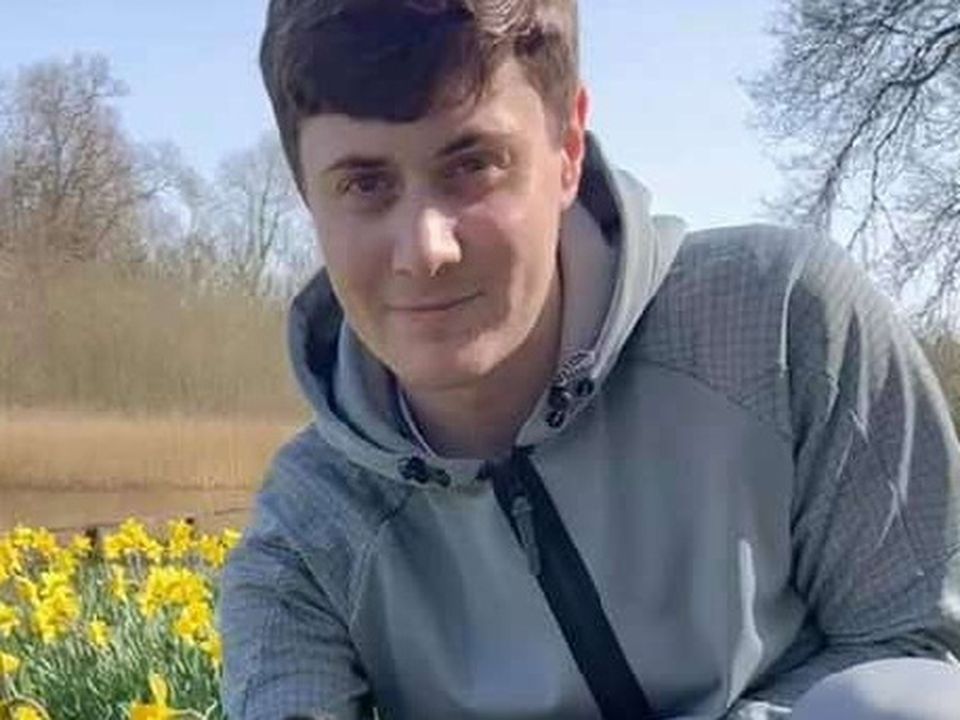
Kelvin
Today’s News in 90 Seconds, Sunday, October 12
However, they were left to fend for themselves as there were no supports available to them.
She is now campaigning to have dual diagnosis included in Ireland’s Mental Health Bill through a petition that has gathered more than 2,630 signatures.
Noeleen also told how she has heard the stories of many other families who have found themselves in similar situations and are losing loved ones as a result.
Asked how life has been since she lost Kelvin in May, she replied with one word “horrendous”.
“I miss him terribly,” she said. “He was a busy person in the house, in the sense that there was a lot of looking after him and supporting him.
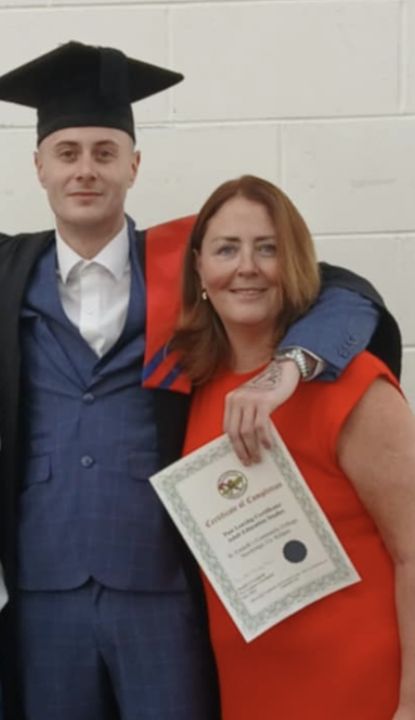
Kelvin with his mum Noeleen, had returned to education shortly before he died in May
“There was a lot of stress and anxiety caused by his mental health that meant daily encouragement and prompting and praising for small things that he would have done.
“For him to go to the shops was a massive achievement. He loved his dog too but there would be days when he wouldn’t be able to look after it.
“I would say to him, ‘go out to the garden and throw a ball out the back’ and he’d struggle to even do that because the darkness would be so heavy on him.
“Sometimes he would and he’d feel better for it but he had to break down every little thing to get a handle on it, simple things that you and I would not even think about.”
Noeleen said that this would mean Kelvin’s sleep was badly affected as he wouldn’t eat during the day due to the medication he was taking and he would wake up hungry.
“There was always stuff going on in his head all the time,” Noeleen said. “He would be texting me, asking me to help with simple things. He couldn’t switch off.”
Noeleen had noticed her son was struggling from an early age, as he had night terrors at 18 months and was “banging his head off the cot”.
“He never slept,” she told Kfm. “Right up until his death, he never slept. We never slept.”
By the time he reached secondary school he was suicidal and at 13 he told Noeleen he was going to take his own life.
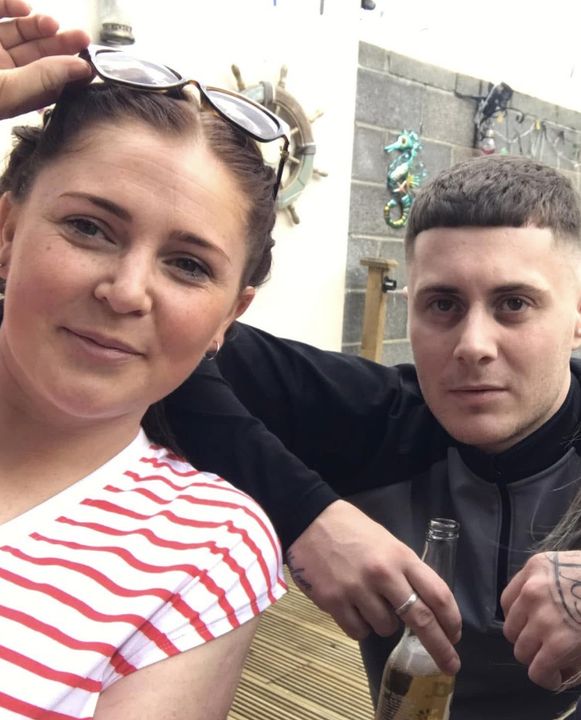
Kelvin with his sister
Following an urgent referral to CAMHS (Child and Adolescent Mental Health Services) that eventually confirmed Asperger’s, Noeleen said she thought things would change but “nothing happened” because the services and structures were not there.
Begging
“With somebody who has Down syndrome, they can go into a service. With Asperger’s, there’s nowhere for them, absolutely nothing,” she said.
Noeleen says she ended up educating herself, taking courses, reading books and even did her dissertation in college on the impact of raising a child with Asperger’s.
“I did everything I could, but I could not break through the barriers of mental health,” she added. As she told her local radio station Kfm: “I wasn’t a professional. I needed help, and Kelvin needed help.”
By the time Kelvin was 16, Noeleen would be in A&E departments begging the hospital for a bed as Kelvin told them he was going to end his life.
“They refused,” she said. “They said he didn’t meet the criteria. I ended up ten hours in A&E one time, holding him, hugging him, trying to keep him alive.”
Noeleen explained that Kelvin was using marijuana and occasionally cocaine in a bid to ease his anxiety.
“He didn’t use it every day but obviously it didn’t help his mental health. But he would have said to me, ‘ma, my medication isn’t doing enough’. And he would be on the highest dose of anti-psychotic medication.”
Noeleen believes that if dual diagnosis was recognised in the Mental Health Act it would provide medical professionals with a set of tools that they could then use to treat people like Kelvin.
“Nobody sat down with Kelvin and told him, ‘this is what you need to do. You need to get yourself drug free, you need yourself clean and sober’.
Kelvin had requested a community detox but was advised by professionals that the risk was too high. This, Noeleen says, was another door shut.
“One has to have an inpatient detox,” she said. “In Kildare there is only Cuan Mhuire treatment centre and a long waiting list for detox but we were unsure that Kelvin, with Asperger’s [and other conditions] would even get a bed. All that would happen is he’d be offered even more medication, and he’d be on the highest dose of an anti-psychotic.
“Both strands, the mental health issue and the substance misuse, has to be treated together, in tandem.”
Noeleen says that since she started bringing Kelvin’s story out into the public eye she has been contacted by a number of people whose loved ones have died in similar circumstances.
“It’s an epidemic, a quiet epidemic,” she said.
“My son didn’t want to die,” she adds. “I know that. I used to say to him, ‘stop trying to fit in so hard’. I’d tell him, ‘it’s OK to be on disability for the rest of your life, and I’m OK with that, I support you’.
“You have this house, and when I’m gone you have a home. You have a girlfriend, a fabulous girlfriend, but all he’d say was, ‘ma, I just want to be like everyone else’. He had hopes for the future, he really did, but it was too much.”
Noeleen said Kelvin had even returned to education, completing a Level 5 in community and social care.
“He died actually two days after graduating. He wanted to go to college. He wanted to work with people. He even had an interview lined up the week after he died.”
Kelvin’s story was raised in the Dáil by Sinn Féin Senator Nicole Ryan, who urged the government to ensure the new Mental Health Bill delivers real change, with joined-up services, proper funding, and laws that protect lives.
A petition created by Noeleen calling for dual diagnosis to be included in the Mental Health Bill has gathered more than 2,700 signatures.
If you have been affected by issues raised in this article, see below for helplines and support services that are available:
Alcohol abuse
Call Alcoholics Anonymous Ireland on 01 842 0700, email gso@alcoholicsanonymous.ie or see alcoholicsanonymous.ie
Call the HSE Drug and Alcohol helpline on 1800 459 459
Depression, anxiety, loneliness, suicide risk
Call Alone on 0818 222 024 or see alone.ie
Call Aware on Freephone 1800 80 48 48 or see aware.ie
Call Samaritans free on 116 123 or email jo@samaritans.ie; or call Pieta on Freephone 1800 247 247 or text HELP to 51444
Visit yourmentalhealth.ie or call the Your Mental Health Information Line at 1800 111 888
Text HELP to Pieta at 51444, call their helpline at 1800 247 247 or visit their website Pieta.ie
Drug abuse
Call the HSE Drugs and Alcohol Helpline on Freephone 1800 459 459 or email helpline@hse.ie
Parenting
Call Parentline helpline at 1890 927 277 or visit their website parentline.ie
Jigsaw work with young people aged 12-25. Call 01 472 7010 or visit jigsaw.ie.

